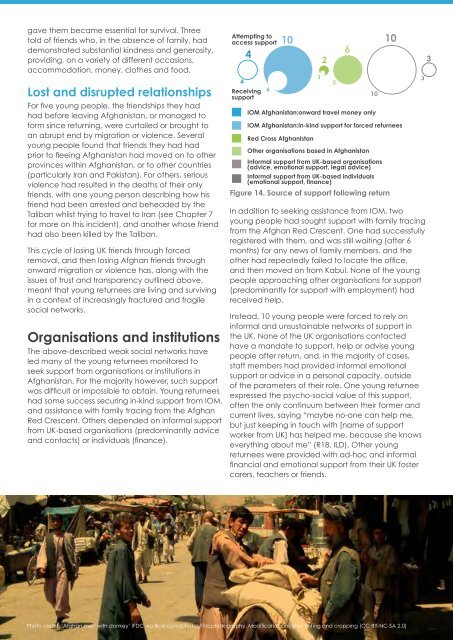After Return
After%20Return_RSN_April%202016
After%20Return_RSN_April%202016
Create successful ePaper yourself
Turn your PDF publications into a flip-book with our unique Google optimized e-Paper software.
gave them became essential for survival. Three<br />
told of friends who, in the absence of family, had<br />
demonstrated substantial kindness and generosity,<br />
providing, on a variety of different occasions,<br />
accommodation, money, clothes and food.<br />
Lost and disrupted relationships<br />
For five young people, the friendships they had<br />
had before leaving Afghanistan, or managed to<br />
form since returning, were curtailed or brought to<br />
an abrupt end by migration or violence. Several<br />
young people found that friends they had had<br />
prior to fleeing Afghanistan had moved on to other<br />
provinces within Afghanistan, or to other countries<br />
(particularly Iran and Pakistan). For others, serious<br />
violence had resulted in the deaths of their only<br />
friends, with one young person describing how his<br />
friend had been arrested and beheaded by the<br />
Taliban whilst trying to travel to Iran (see Chapter 7<br />
for more on this incident), and another whose friend<br />
had also been killed by the Taliban.<br />
This cycle of losing UK friends through forced<br />
removal, and then losing Afghan friends through<br />
onward migration or violence has, along with the<br />
issues of trust and transparency outlined above,<br />
meant that young returnees are living and surviving<br />
in a context of increasingly fractured and fragile<br />
social networks.<br />
Organisations and institutions<br />
The above-described weak social networks have<br />
led many of the young returnees monitored to<br />
seek support from organisations or institutions in<br />
Afghanistan. For the majority however, such support<br />
was difficult or impossible to obtain. Young returnees<br />
had some success securing in-kind support from IOM,<br />
and assistance with family tracing from the Afghan<br />
Red Crescent. Others depended on informal support<br />
from UK-based organisations (predominantly advice<br />
and contacts) or individuals (finance).<br />
Attempting to<br />
access support<br />
4<br />
4<br />
Receiving<br />
support<br />
4<br />
10 10<br />
6<br />
IOM Afghanistan:onward travel money only<br />
IOM Afghanistan:in-kind support for forced returnees<br />
Red Cross Afghanistan<br />
Other organisations based in Afghanistan<br />
Informal support from UK-based organisations<br />
(advice, emotional support, legal advice)<br />
Informal support from UK-based individuals<br />
(emotional support, finance)<br />
Figure 14. Source of support following return<br />
1<br />
2<br />
In addition to seeking assistance from IOM, two<br />
young people had sought support with family tracing<br />
from the Afghan Red Crescent. One had successfully<br />
registered with them, and was still waiting (after 6<br />
months) for any news of family members, and the<br />
other had repeatedly failed to locate the office,<br />
and then moved on from Kabul. None of the young<br />
people approaching other organisations for support<br />
(predominantly for support with employment) had<br />
received help.<br />
Instead, 10 young people were forced to rely on<br />
informal and unsustainable networks of support in<br />
the UK. None of the UK organisations contacted<br />
have a mandate to support, help or advise young<br />
people after return, and, in the majority of cases,<br />
staff members had provided informal emotional<br />
support or advice in a personal capacity, outside<br />
of the parameters of their role. One young returnee<br />
expressed the psycho-social value of this support,<br />
often the only continuum between their former and<br />
current lives, saying “maybe no-one can help me,<br />
but just keeping in touch with [name of support<br />
worker from UK] has helped me, because she knows<br />
everything about me” (R18, ILD). Other young<br />
returnees were provided with ad-hoc and informal<br />
financial and emotional support from their UK foster<br />
carers, teachers or friends.<br />
0<br />
10<br />
3<br />
3<br />
Photo credit: ‘Afghan men with donkey’ IFDC via flickr.com/photos/ifdcphotography. Modifications include tinting and cropping (CC BY-NC-SA 2.0)<br />
<strong>After</strong> <strong>Return</strong> 24


